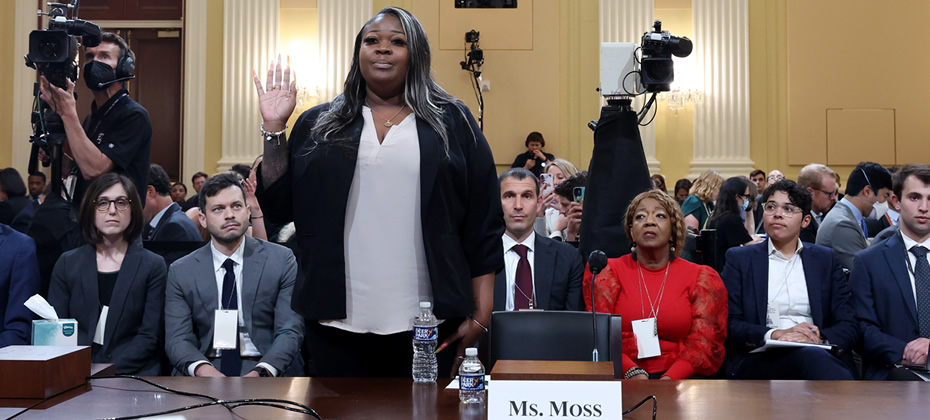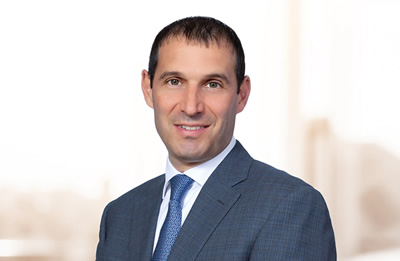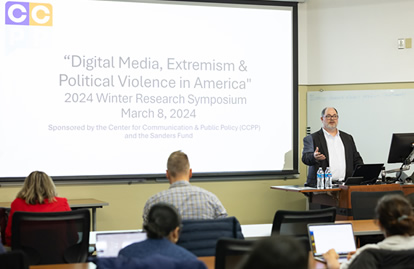Fighting disinformation with facts

The landmark verdict last December that found former New York City mayor Rudy Giuliani liable for defaming two Georgia election workers in the aftermath of the 2020 election was memorable for multiple reasons: the hefty $148 million in damages Giuliani must pay; the measurable merits of fighting rampant disinformation; the David-vs.-Goliath triumph of Fulton County’s Ruby Freeman and Shaye Moss over a former US attorney; and the wall of Wildcats standing behind the two women.

Michael Gottlieb (WCAS99) and Meryl Governski (MSJ04), partners at the Washington, DC, law firm Willkie, Farr and Gallagher LLP, led the pro bono legal team representing Freeman and Moss in a defamation suit against Giuliani, whose lies about the mother-daughter duo upended their lives. And the case’s expert witness, whom both attorneys lauded as critical to their success, was Ashlee Humphreys, a professor at the Medill School of Journalism, Media, Integrated Marketing Communications.
“Northwestern is a national leader, the best in the business, when it comes to teaching communications, marketing, and journalism,” Governski says. “It’s no accident that I came up through Northwestern and that Mike and Ashlee did too. This is what Northwestern excels at: teaching a variety of disciplines that when used in collaboration can produce outcomes more significant than the sum of their parts.”
***
While none of the Northwestern alumni involved in the case is a School of Communication graduate, Gottlieb has strong ties to the school through his student years as a champion on the Northwestern Debate Team, the winningest program in intercollegiate debate history. Gottlieb twice won the National Debate Tournament in the school’s signature fast-talking policy debate format. Later he served for many years on the school’s National Advisory Council (now the Board of Advisors).
His debate talent and drive naturally led him to an ascendent legal career, which has included serving as an associate White House counsel and special assistant to President Barack Obama. As a litigator in defamation suits, he represented the family of Seth Rich, the murdered former Democratic National Committee employee, as well as James Alefantis, who was ensnared in the PizzaGate conspiracy theory as owner of the Comet Ping Pong restaurant. Gottlieb worked on the Rich and Giuliani cases with Governski, who received her master’s degree in journalism at Medill before pivoting to law.
The pair began to understand how social media had worsened the proliferation of disinformation when they represented the DNC in 2016 in a series of legal challenges to voter suppression efforts. “That was the first time I saw and started to understand how quickly disinformation was spreading and how powerful these amplifying social media networks were,” Gottlieb says.
With their successes in these cases, Gottlieb and Governski were well suited to represent Moss and Freeman and well prepared to address how deeply political lies and conspiracy theories can damage average citizens. Giuliani repeatedly and falsely accused the two poll workers of interfering on behalf of Joe Biden’s campaign in the hand count of Fulton County ballots following the 2020 election—accusations that metastasized in the right-wing media ecosystem to generate smear campaigns, death threats, racist and sexist invectives, and a weighty toll on Moss and Freeman’s personal and professional lives. The question then became, who can help quantify the reputational damage these women needlessly endured?
Gottlieb recalls that, while working on the Seth Rich case, “Meryl and I were frustrated that we couldn’t find somebody. And I said, ‘There’s got to be somebody at Northwestern who studies this.’”
Governski recalls that when they started scrolling through the University’s websites, “The heavens opened, and Ashlee Humphreys was there. In addition to having this incredible background and expertise that directly fit what we were looking for, she was willing to look at this in a different, creative way and apply her expertise to the landscape of disinformation.”
***
As Gottlieb explains, the bar for defamation cases is very high by design. And with the stakes in the Giuliani case that much higher, their case had to be watertight. Enter expert witness Humphreys.
Her work at Medill examines consumer behavior, social media trends, and marketing strategy through a sociological lens. With these defamation suits, the metrics for measuring reputational damage can be complex and can vary case by case. For Moss and Freeman, Humphreys had to track and measure not only Giuliani’s own statements but also those parroted by Donald Trump, his vocal followers, and the media covering the story. Her metric factored in impressions, speed of spread, and the platforms used to disseminate the lies. She asserted that it would cost from $17.8 million to $47.8 million to repair the damage done to Moss and Freeman.
“The challenge in preparing for a trial is how do you explain this methodology to a jury,” Humphreys said, “so they both trust the number you come up with and also understand at least the outlines of how you got to it.” Her testimony worked: Giuliani was held accountable and ruled liable to the tune of a nine-figure sum. The team then pivoted to his bankruptcy proceedings.
“This model for damages to reputation really is suited for statements that circulate and get millions and millions of impressions,” Humphreys added.
And it won't be the last we hear of it.
***
With another contentious presidential election in the very recent rearview mirror and disinformation being ever more entrenched in online discourse, despair is understandable. But Gottlieb sees things differently.
Litigation “is a very useful tool against certain kinds of disinformation, and a useful tool when applied properly against some of the worst actors,” he said. “Our hope is that these verdicts will make people think twice before they target specific individuals as scapegoats in a political campaign.”
The verdicts also signal a shift in how we—as a society, as an educational institution—tread on the topic of information and its spread and consumption.
“It’s a massive cross-disciplinary field. We’re talking about the intersection of law, economics, politics, technology, and even philosophy,” Gottlieb says. “Information as a discipline touches almost every school at Northwestern.”
In addition to applications in communication, journalism, and computer science, enhancing our understanding of information flow can help address a growing mental health crisis among young people, who are now exposed to an endless firehose of content that is often weaponized and intentionally addictive. “Why do I receive the information that I receive?” Gottlieb posited. “What goes into that? How are the economy, social media, and our political system all components of that?”
As the School of Communication tackles these issues with its own brain trust and resources (see sidebar), Gottlieb, Governski, and Humphreys are girding for their next battle, whatever it may be.
“We’re interested in continuing to represent clients in matters that are significant in terms of defending truth and fighting disinformation,” declared Gottlieb. “We want to be on the side of truth.”

